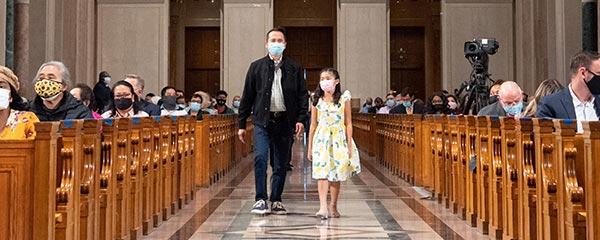Story Highlights
- 47% think abortion is morally acceptable; 46%, morally wrong
- Americans still split between "pro-choice" (49%) and "pro-life" (47%)
- 48% want abortion legal with limits, 32% completely legal, 19% illegal
WASHINGTON, D.C. -- Americans are sharply divided in their abortion views, including on its morality, with an equal split between those who believe it is morally acceptable and those who say it is morally wrong. The 47% who say it is acceptable is, by two percentage points, the highest ║┌┴¤═° has recorded in two decades of measurement. Just one point separates them from the 46% who think abortion is wrong from a moral perspective.

Line graph. Americans' views of abortion as morally acceptable or morally wrong since 2001. The latest data, from 2021, find a record-high 47% saying it is morally acceptable and 46% morally wrong. Since 2001, the gap in these readings has varied between zero and 20 percentage points.
Since 2001, the gap between these readings has varied from zero to 20 points. The latest gap, based on a May 3-18 ║┌┴¤═° poll, is slightly smaller than last year's, when 47% thought abortion was morally wrong and 44% said it was morally acceptable. Americans have been typically more inclined to say abortion is morally wrong than morally acceptable, though the gap has narrowed in recent years. The average gap has been five points since 2013 (43% morally acceptable and 48% morally wrong), compared with 11 points between 2001 and 2012 (39% and 50%, respectively).
Democrats and political independents have become more likely to say abortion is morally acceptable. Sixty-four percent of Democrats, 51% of independents and 26% of Republicans currently hold this view.

Line graph. Percentages of partisans who view abortion as morally acceptable since 2001. The latest data, from 2021, find 64% of Democrats, 51% of independents and 26% of Republicans think abortion is morally acceptable. In nearly every year since 2005, majorities of Democrats have expressed a belief in the moral acceptability of abortion. No more than 31% of Republicans and half of independents have held the same view since 2001.
In nearly every year since 2005, majorities of Democrats have expressed a belief in the moral acceptability of abortion. Meanwhile, no more than 31% of Republicans and 51% of independents have held the same view since 2001.
Americans Split Between Pro-Life and Pro-Choice Stances
Just as the public is evenly divided in their beliefs about the morality of abortion, so too are they about equally likely to personally identify as "pro-choice" (49%) versus "pro-life" (47%).
Americans have been closely split in how they identify their abortion stances in recent years. Since 1998, an average 47% of U.S. adults have considered themselves pro-choice and 46% pro-life. Between 1995 and 1997, the public tilted more pro-choice (52%) than pro-life (38%), on average.

Line graph. Percentages of Americans who consider themselves pro-choice and pro-life since 1995. In 2021, 49% identify as pro-choice and 47% pro-life. Since 1998, an average 47% of U.S. adults have considered themselves pro-choice and 46% pro-life. Between 1995 and 1997, the public tilted more pro-choice than pro-life, on average.
Partisans' stances on abortion are in line with their views of its moral acceptability. That is, Democrats largely consider themselves to be pro-choice (70%), while most Republicans say they are pro-life (74%). A slim majority of independents are pro-choice.
The preferred abortion labels of demographic subgroups that typically align with the Democratic and Republican parties are as would be expected. Majorities of women, young adults, college graduates and liberals say they are pro-choice, and Republican-leaning subgroups such as men, older adults, those without college degrees and conservatives self-identify as pro-life.
| Pro-choice | Pro-life | |||||||||||||||||||||||||||||||||||||||||||||||||||||||||||||||||||||||||||||||||||||||||||||||||||
|---|---|---|---|---|---|---|---|---|---|---|---|---|---|---|---|---|---|---|---|---|---|---|---|---|---|---|---|---|---|---|---|---|---|---|---|---|---|---|---|---|---|---|---|---|---|---|---|---|---|---|---|---|---|---|---|---|---|---|---|---|---|---|---|---|---|---|---|---|---|---|---|---|---|---|---|---|---|---|---|---|---|---|---|---|---|---|---|---|---|---|---|---|---|---|---|---|---|---|---|---|
| % | % | |||||||||||||||||||||||||||||||||||||||||||||||||||||||||||||||||||||||||||||||||||||||||||||||||||
| Party identification | ||||||||||||||||||||||||||||||||||||||||||||||||||||||||||||||||||||||||||||||||||||||||||||||||||||
| Republican | 22 | 74 | ||||||||||||||||||||||||||||||||||||||||||||||||||||||||||||||||||||||||||||||||||||||||||||||||||
| Independent | 53 | 41 | ||||||||||||||||||||||||||||||||||||||||||||||||||||||||||||||||||||||||||||||||||||||||||||||||||
| Democrat | 70 | 26 | ||||||||||||||||||||||||||||||||||||||||||||||||||||||||||||||||||||||||||||||||||||||||||||||||||
| Gender | ||||||||||||||||||||||||||||||||||||||||||||||||||||||||||||||||||||||||||||||||||||||||||||||||||||
| Male | 45 | 50 | ||||||||||||||||||||||||||||||||||||||||||||||||||||||||||||||||||||||||||||||||||||||||||||||||||
| Female | 52 | 43 | ||||||||||||||||||||||||||||||||||||||||||||||||||||||||||||||||||||||||||||||||||||||||||||||||||
| Age | ||||||||||||||||||||||||||||||||||||||||||||||||||||||||||||||||||||||||||||||||||||||||||||||||||||
| 18-34 | 55 | 39 | ||||||||||||||||||||||||||||||||||||||||||||||||||||||||||||||||||||||||||||||||||||||||||||||||||
| 35-54 | 49 | 45 | ||||||||||||||||||||||||||||||||||||||||||||||||||||||||||||||||||||||||||||||||||||||||||||||||||
| 55 and older | 43 | 54 | ||||||||||||||||||||||||||||||||||||||||||||||||||||||||||||||||||||||||||||||||||||||||||||||||||
| Education | ||||||||||||||||||||||||||||||||||||||||||||||||||||||||||||||||||||||||||||||||||||||||||||||||||||
| College graduate | 65 | 32 | ||||||||||||||||||||||||||||||||||||||||||||||||||||||||||||||||||||||||||||||||||||||||||||||||||
| Not a college graduate | 40 | 55 | ||||||||||||||||||||||||||||||||||||||||||||||||||||||||||||||||||||||||||||||||||||||||||||||||||
| Political ideology | ||||||||||||||||||||||||||||||||||||||||||||||||||||||||||||||||||||||||||||||||||||||||||||||||||||
| Conservative | 18 | 78 | ||||||||||||||||||||||||||||||||||||||||||||||||||||||||||||||||||||||||||||||||||||||||||||||||||
| Moderate | 56 | 38 | ||||||||||||||||||||||||||||||||||||||||||||||||||||||||||||||||||||||||||||||||||||||||||||||||||
| Liberal | 80 | 17 | ||||||||||||||||||||||||||||||||||||||||||||||||||||||||||||||||||||||||||||||||||||||||||||||||||
| ║┌┴¤═°, May 3-18, 2021 | ||||||||||||||||||||||||||||||||||||||||||||||||||||||||||||||||||||||||||||||||||||||||||||||||||||
More Favor Limits on Abortions Than Outright Ban
Americans remain much more likely to believe abortion should be legal "only under certain circumstances" (48%) than to favor it being legal "under any circumstances" (32%) or "illegal in all circumstances" (19%). The nearly one-third of U.S. adults who support fully legal abortions is the highest such percentage since the early to mid-1990s, when it was consistently at that level.
These latest data follow a pattern similar to the one for ║┌┴¤═°'s entire trend since 1975, when tracking began.

Line graph. Percentages of Americans who think abortions should be legal under any circumstances, legal only under certain circumstances or illegal in all circumstances. In 2021, 48% think they should be legal in some cases, 32% legal in any and 19% illegal in all. These latest data follow a pattern similar to the one for ║┌┴¤═°'s entire trend since 1975, when tracking began.
║┌┴¤═° further probes those who think abortion should be legal only in certain circumstances by asking whether they think it should be legal in "most" or "only in a few" situations. Since 1994, when this measure was first tracked, the group has leaned much more heavily toward the more restrictive option. Currently, 33% favor legal abortions in only a few and 13% in most circumstances. This translates into 52% supporting a more restrictive approach on abortion, saying it should be either illegal in all circumstances or legal in only a few. Meanwhile, 45% favor a less restrictive approach, preferring that it be legal in all or most circumstances.
Americans' preferences for the legality of abortion diverge among demographic subgroups, including by political party, gender, age, education and political ideology. Liberals are the only one of these with majority-level support for legal abortions under any circumstances. However, majorities of Democrats, women, young adults, college graduates and moderates support abortions in most or all circumstances.
While none of the demographic groups supports making abortion illegal in all circumstances, majorities of the following groups favor making it illegal or legal in only a few situations: Republicans, men, older adults, those without college degrees and conservatives.
| Legal under any | Legal in most | Legal in only a few | Illegal in all | |||||||||||||||||||||||||||||||||||||||||||||||||||||||||||||||||||||||||||||||||||||||||||||||||
|---|---|---|---|---|---|---|---|---|---|---|---|---|---|---|---|---|---|---|---|---|---|---|---|---|---|---|---|---|---|---|---|---|---|---|---|---|---|---|---|---|---|---|---|---|---|---|---|---|---|---|---|---|---|---|---|---|---|---|---|---|---|---|---|---|---|---|---|---|---|---|---|---|---|---|---|---|---|---|---|---|---|---|---|---|---|---|---|---|---|---|---|---|---|---|---|---|---|---|---|---|
| % | % | % | % | |||||||||||||||||||||||||||||||||||||||||||||||||||||||||||||||||||||||||||||||||||||||||||||||||
| U.S. adults | 32 | 13 | 33 | 19 | ||||||||||||||||||||||||||||||||||||||||||||||||||||||||||||||||||||||||||||||||||||||||||||||||
| Party identification | ||||||||||||||||||||||||||||||||||||||||||||||||||||||||||||||||||||||||||||||||||||||||||||||||||||
| Republican | 15 | 8 | 46 | 31 | ||||||||||||||||||||||||||||||||||||||||||||||||||||||||||||||||||||||||||||||||||||||||||||||||
| Independent | 32 | 14 | 33 | 17 | ||||||||||||||||||||||||||||||||||||||||||||||||||||||||||||||||||||||||||||||||||||||||||||||||
| Democrat | 50 | 19 | 22 | 8 | ||||||||||||||||||||||||||||||||||||||||||||||||||||||||||||||||||||||||||||||||||||||||||||||||
| Gender | ||||||||||||||||||||||||||||||||||||||||||||||||||||||||||||||||||||||||||||||||||||||||||||||||||||
| Male | 29 | 12 | 38 | 19 | ||||||||||||||||||||||||||||||||||||||||||||||||||||||||||||||||||||||||||||||||||||||||||||||||
| Female | 36 | 15 | 29 | 19 | ||||||||||||||||||||||||||||||||||||||||||||||||||||||||||||||||||||||||||||||||||||||||||||||||
| Age | ||||||||||||||||||||||||||||||||||||||||||||||||||||||||||||||||||||||||||||||||||||||||||||||||||||
| 18-34 | 41 | 11 | 25 | 20 | ||||||||||||||||||||||||||||||||||||||||||||||||||||||||||||||||||||||||||||||||||||||||||||||||
| 35-54 | 32 | 15 | 34 | 16 | ||||||||||||||||||||||||||||||||||||||||||||||||||||||||||||||||||||||||||||||||||||||||||||||||
| 55 and older | 27 | 13 | 39 | 20 | ||||||||||||||||||||||||||||||||||||||||||||||||||||||||||||||||||||||||||||||||||||||||||||||||
| Education | ||||||||||||||||||||||||||||||||||||||||||||||||||||||||||||||||||||||||||||||||||||||||||||||||||||
| College graduate | 43 | 19 | 25 | 10 | ||||||||||||||||||||||||||||||||||||||||||||||||||||||||||||||||||||||||||||||||||||||||||||||||
| Not a college graduate | 26 | 10 | 38 | 23 | ||||||||||||||||||||||||||||||||||||||||||||||||||||||||||||||||||||||||||||||||||||||||||||||||
| Political ideology | ||||||||||||||||||||||||||||||||||||||||||||||||||||||||||||||||||||||||||||||||||||||||||||||||||||
| Conservative | 10 | 7 | 45 | 37 | ||||||||||||||||||||||||||||||||||||||||||||||||||||||||||||||||||||||||||||||||||||||||||||||||
| Moderate | 37 | 16 | 36 | 9 | ||||||||||||||||||||||||||||||||||||||||||||||||||||||||||||||||||||||||||||||||||||||||||||||||
| Liberal | 58 | 20 | 12 | 8 | ||||||||||||||||||||||||||||||||||||||||||||||||||||||||||||||||||||||||||||||||||||||||||||||||
| ║┌┴¤═°, May 3-18, 2021 | ||||||||||||||||||||||||||||||||||||||||||||||||||||||||||||||||||||||||||||||||||||||||||||||||||||
Bottom Line
Abortion remains a divisive issue in the U.S., with roughly equal percentages coming down on either side of the morality of abortion, which is a recent development, and a more enduring close division on self-identification as pro-choice or pro-life. The partisan gap in abortion attitudes continues to be large. Americans' views on the legality of abortion remain likewise divided and similar to what they have been since the 1970s.
The divisiveness is playing out mostly in state governments, with a number of Republican-controlled states working to legislate greater abortion restrictions. These laws may violate what is permitted by prior Supreme Court rulings, and they are being challenged in courts before they can take effect. However, proponents of more restrictions are hoping a Supreme Court with six Republican-nominated justices will be sympathetic to their cause and alter precedent to allow such laws to stand. The high court has agreed to hear a case on an abortion law in its next term, making a precedent altering-decision more than a hypothetical possibility.
View complete question responses and trends (PDF download).
Learn more about how the works.




